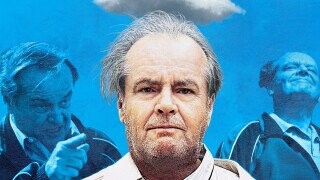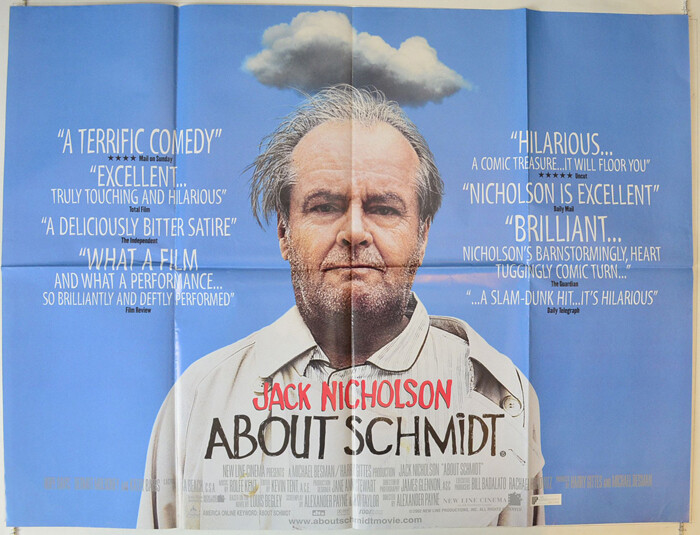Jack Nicholson’s Last Great Performance Was in the Very Sad Comedy ‘About Schmidt’

It used to seem like Jack Nicholson was everywhere. Courtside to watch the Los Angeles Lakers. Front row of the Oscars. A star in hit movies. Always larger than life, always flashing that smile, always our Jack. But nothing lasts forever, and at 85, the three-time Oscar-winner is now mostly away from the spotlight. He never officially retired, but he hasn’t been in a film since 2010, playing a small, forgettable role in the underwhelming How Do You Know.
Of all of Nicholson’s onscreen talents, disappearing was never one of them. Although he brought nuance and subtlety, he also had no problem going big, turning his characters into amped-up expressions of swaggering sex appeal, anguished longing or (in the case of something like The Shining) utter madness. Whether dramatic or comedic, he was explosive, his devilish grin, wry wit and ingratiating laugh his indelible trademarks. If anything, Jack Nicholson’s very Jack Nicholson-ness sometimes posed a problem: Once he became a superstar, he couldn’t entirely shake free of that oversized persona that was beloved by millions of moviegoers.
Don't Miss
Tuesday is the 20th anniversary of a film in which he gave a performance that pushed against his movie-star essence more than any other. Directed and co-written by Alexander Payne, About Schmidt was the last time he received an Oscar nomination, and it’s also his last great role. (My apologies to fans of Something’s Gotta Give and The Departed, but let’s be fair: Sure, he’s fun in those movies, but never that surprising.) As Warren Schmidt, Nicholson tapped into something very different within himself, in the process delivering a low-key comedic masterclass. The secret was simple: As Nicholson put it at the time, “(Payne) asked me to play a small man.”
About Schmidt was Payne’s follow-up to the brilliant high-school satire Election, which had earned him and his writing partner Jim Taylor an Oscar nomination for adapting Tom Perrotta’s novel. Payne parlayed that clout into making another intimate story set in his modest Midwestern hometown of Omaha, Nebraska. Nicholson plays Schmidt, a sixty-something actuary who’s about to retire. Not excited by the prospect of being put out to pasture — and quietly resentful of his longtime wife Helen (June Squibb) — Schmidt is slowly coming to the realization that his life has turned out to be a big, fat nothing. Unimpressive career, unsatisfying marriage, a daughter (Hope Davis) he adores but who lives too far away and is about to marry a total schmuck (a wonderfully skeezy Dermot Mulroney): Yep, Schmidt has little to show for himself. And when Helen dies unexpectedly, he has even less, finding out after the fact that she’d been having an affair for years. His future supremely barren, Schmidt decides to travel to Denver to stop his little girl Jeannie from marrying Randall. Hey, it’s better than just wasting away in front of the TV.
In anyone else’s hands, About Schmidt would probably be a bleak drama, but Payne saw it all as a bittersweet comedy about a hopelessly mediocre man. The movie ribs the guy but also has compassion for his sense of crushing disappointment, a tonal mixture that wouldn’t have worked if Nicholson had turned on the star wattage. Instead, the actor, whose youthful rebelliousness was the catalyst for so many counterculture classics of the 1970s, like Five Easy Pieces and One Flew Over the Cuckoo’s Nest, embraced being an older man. Nicholson allowed himself to have a humiliating comb-over. He walked around in Schmidt’s unfashionable sweaters. The man who was an international sex symbol came across as an unremarkable schlub. Which didn’t mean any of that was easy for him.
“Every day I would look into that mirror and think, terrified, ‘What if I get stuck in this character?’” Nicholson later said. “‘What if I can’t get back to me?’”
Guided by Payne and Taylor’s sardonic script, Nicholson found a latter-day equivalent to the lusty outcasts he played in his early career. Schmidt had none of the daring of a Jake Gittes or the cocky showmanship of the Joker, but they all shared a nagging discontent — a sense that the world wasn’t fair and they were the ones getting screwed. But Schmidt’s ordinariness made his growing grievances deeply hilarious, his impotent anger at the things he couldn’t control a biting commentary about all us everyday schmucks who trudge through life, always vaguely unhappy, constantly unsure how to change our circumstances. Of the movie’s many funny/sad moments, one that’s always stayed with me involves Schmidt deciding to live a little by splurging for a Dairy Queen Blizzard. When he’s asked what size he wants, Schmidt considers it and then finally settles for… medium. Even while throwing caution to the wind, the poor guy is too mild-mannered to go all the way.
Sometimes actors are praised for their radical onscreen transformations — they’ll lose or gain a bunch of weight, do a crazy accent, get buried in makeup — but Nicholson’s disappearing act was more effortless, tamping down his buoyant extremes to portray someone whose dreams died a long time ago. Schmidt looks frumpled, disheveled, but still very much like the Jack Nicholson we know. It was as if we’d briefly entered a parallel dimension where one of the most famous men on the planet had wound up a nobody. Nicholson didn’t hide from that emptying-out, expressing his pleasure at the movie’s poster, which made him look singularly unglamorous. “Our production team fought very hard to get that as the one-sheet,” he later bragged.

But the vulnerability that Nicholson lent Schmidt didn’t protect the man from Payne’s barbs: The filmmaker loves his Nebraskan characters, but he also enjoys mocking their shortsightedness and relative lack of sophistication. Nicholson brings these shortcomings to life beautifully in About Schmidt’s best running bit, which involves Schmidt corresponding with Ndugu, an impoverished six-year-old Tanzanian who he fosters through one of those charity groups you see advertised on television. Encouraged to write a letter that tells Ndugu a little about himself, Schmidt quickly starts composing a diatribe in which he rants about all his disappointments, never once considering that a starving African boy probably won’t care about the problems of a privileged American whose big gripe is that he’s been replaced at work by a younger guy. (In a rare moment of self-awareness, kinda, Schmidt closes the letter with “You probably wanna hurry on down and cash my check and get yourself something to eat.”) The joke would have fallen flat if Nicholson was winking — if he kept trying to signal to the audience that he’s definitely nothing like this loser Schmidt — but because he so hones in on Schmidt’s resigned bitterness, the moment feels real and also really funny.
Years after Easy Rider and Five Easy Pieces, Nicholson goes on a very different road trip in About Schmidt. In those earlier movies, America was depicted as this thrilling, wide-open place where anything was possible. But in Payne’s film, Schmidt just keeps bumping into things that make him sad and angry — especially when he arrives in Denver and starts to get to know Randall’s family. (Kathy Bates, as Randall’s mom, is great during a hot tub scene between the two Oscar-winners.) Repeatedly, Schmidt is reminded that the world has passed him by — that he’s powerless to change much of anything, including convincing Jeannie to call off the wedding — and because Nicholson doesn’t resort to the actorly pyrotechnics he usually utilizes to great effect, the smallness of the character is even more acute. Here’s an actor whose anti-authority demeanor made him an icon — and, yet, for About Schmidt, he figured out how to erase all that to find the humor in someone who never took a chance, never did anything bold.
“This is the least vain performance I think I’ve ever given,” Nicholson once said of Schmidt, adding that the character “is a miserable man to inhabit.” Funny thing, though: It wasn’t miserable to watch him in the role. Occasionally, big stars make a big show of playing “real people,” which often results in a bunch of folksy mannerisms and self-conscious striving for “authenticity.” Nicholson did none of that in About Schmidt, relying on his skill to bring immediacy and passion to any character, even somebody who’s sleepwalking like Walter Schmidt. The trick might have been Schmidt’s profession, a bottom-line, number-crunching sort of job that requires a sharp analytical mind — the exact opposite personality, you might argue, of someone as freewheeling and impetuous as Nicholson. But Nicholson doesn’t condescend to the guy. Deep down, I think he empathized with him.
“He deals with facts,” Nicholson once said, “and then in the course of this movie everything is taken systematically away from him: His wife dies, his daughter is going away, his job is over now. But whether he is deluded or not, we see that there is a center to the man. There is something left.”
Nicholson provides that quiet center to Warren Schmidt. If you haven’t seen About Schmidt — or if it’s been a while and you don’t remember it too well — I don’t want to spoil the ending. But the film concludes with tears, not laughs. This is the kind of great comedy that inspires a whole gamut of emotions. It has so many great jokes and one-liners — so many memorable side characters and smart observations about aging and regret — but it can also break your heart. Nicholson would go on to do crowd-pleasing hits like The Bucket List, but he never again mined something so genuine.
Playing a seeming nobody, he demonstrated how extraordinary an actor he was.